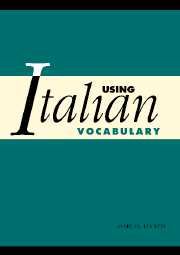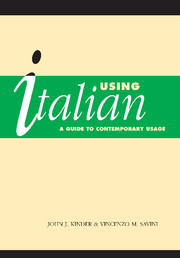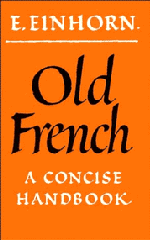Using Italian Vocabulary
Using Italian Vocabulary provides the student of Italian with an in-depth, structured approach to the learning of vocabulary. It can be used for intermediate and advanced undergraduate courses, or as a supplementary manual at all levels - including elementary level - to supplement the study of vocabulary. The book is made up of twenty units covering topics that range from clothing and jewellery, to politics and environmental issues, with each unit consisting of words and phrases that have been organized thematically and according to levels so as to facilitate their acquisition. The book will enable students to acquire a comprehensive control of both concrete and abstract vocabulary allowing them to carry out essential communicative and interactional tasks.
• A practical topic-based textbook that can be inserted into all types of course syllabi
• Provides exercises and activities for classroom and self-study
• Answers are provided for a number of exercises
- Lists vocabulary in a functional fashion, according to themes and frequency for easy learning
- Provides exercises and activities that allow the learner to use the vocabulary functionally
- Includes 40 texts taken from the classic literature repertory that illustrate the use of vocabulary
Product details
August 2003Paperback
9780521524254
492 pages
238 × 170 × 31 mm
0.913kg
178 exercises
Available
Table of Contents
- Introduction
- 1. Towns, cities, and building
- The household
- Gardens
- 2. The physical world
- The animal world
- The weather
- 3. The body
- Health services
- 4. Physical appearance
- Body language
- 5. Personality
- Behavior
- 6. Clothing, footwear, and accessories
- Food and drink
- 7. Perception, moods, and the mind
- Materials and textures
- 8. Quantity, shape, measurement, and size
- Containers
- 9. The arts
- The media
- 10. Literature and writing
- Expression, interacting, speaking, reading, writing, and phoning
- 11. Leisure
- Sport
- 12. Travel
- Transportation
- 13. The life cycle
- Religion
- 14. Education
- Science
- 15. Agriculture
- Industry
- 16. The business world
- Employment
- 17. The office and computing
- Communications
- 18. Law
- Finance
- 19. Geography
- History and war
- 20. Politics
- Social services and social issues.










